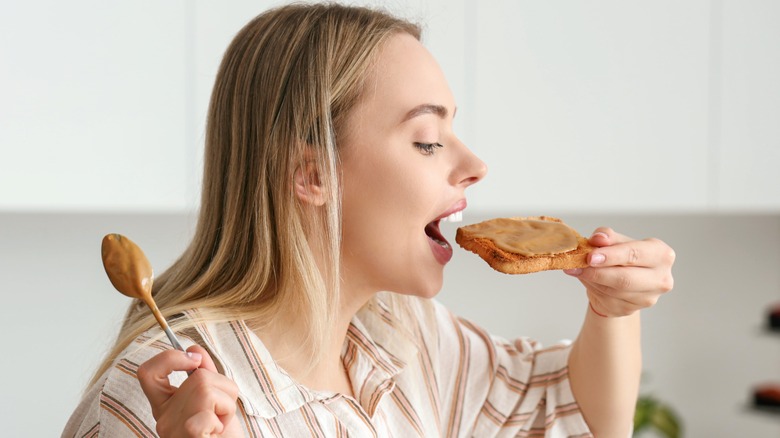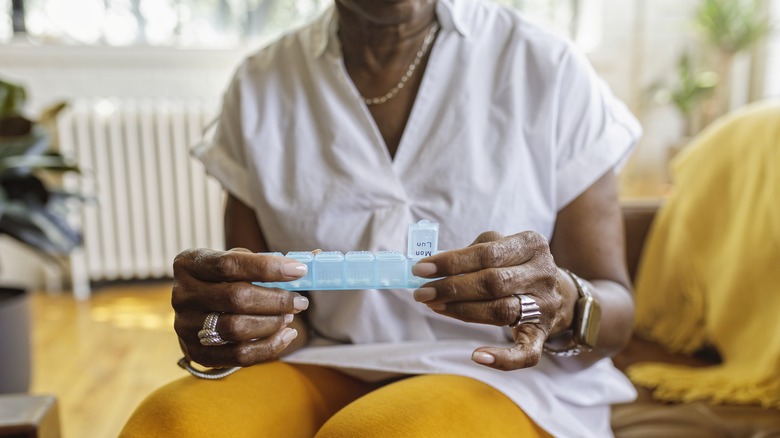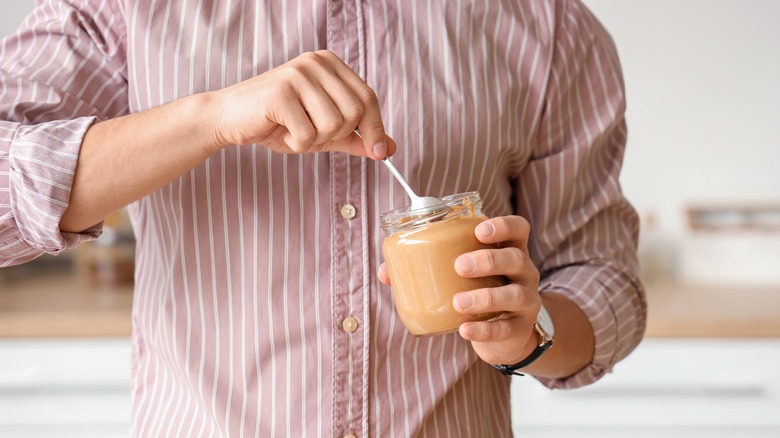Avoid Eating Too Much Peanut Butter If You Take This Type Of Medication
Peanut butter's association with heart health is well known. Among the common diseases peanut butter can help prevent is heart disease. While the oleic acid content in the nut butter spread is thought to maintain good cholesterol, blood sugar, and blood pressure levels, peanut butter is also a natural source of the amino acid arginine, which has been linked with improving blood vessel function and, thus, the prevention of vascular disease.
But eating too much peanut butter can also have negative outcomes. From allergies and weight gain (owing to its high calories) to raised cholesterol levels (because of its saturated fat content) and added sugar concerns, there are risks to overconsumption of even a good thing. Peanut butter can also interfere with a type of medication that is taken for heart-related concerns: blood thinners.
Blood thinners work by preventing the formation of clots in your blood vessels and heart, something that is necessary to prevent blockages, heart attacks, and strokes. Certain nutrients and compounds found in peanut butter can mess with the function of these medications.
How does peanut butter negatively interact with blood thinners?
Peanut butter contains vitamin E and resveratrol, both of which can increase the side effects of blood thinners. Vitamin E-rich foods are considered natural blood thinners themselves. We're talking spinach, tomatoes, kiwis, mangoes, and yes, peanut butter. When consumed in excess with blood thinning medications like warfarin (Coumadin), aspirin, and clopidogrel (Plavix), vitamin E can increase your risk of bleeding.
Resveratrol, which is found in peanuts and peanut butter, is a polyphenol that has been associated with the prevention of skin cancer, protection against heart disease, and improving insulin sensitivity. It is also, however, thought to slow blood clotting (via WebMD). Consuming this polyphenol with blood thinners could also increase your risk of bruising and bleeding.
That being said, vitamin E's benefits for heart health have mixed results, per science. Because it reduces the risk of blood clotting, it could prevent heart attacks and sudden death (via ScienceDaily). However, there is also research that suggests that vitamin E supplementation should be avoided by people with severe heart disease (per Mayo Clinic). Back to blood thinners, how much peanut butter should you be eating?
Can people on blood thinner medications still eat peanut butter?
While science isn't entirely sure how much of vitamin E leads to a blood-thinning effect, there is some consensus that a person would need to consume more than 400 international units (IU) a day for this to happen. An ounce of dry roasted peanuts has 2.2 milligrams of vitamin E, a very small amount of IU.
Blood-thinning medications aside, experts often talk about the dangers of overconsuming peanut butter in general, for overall health. Because the popular nut butter is rich, creamy, and delicious, it is easy to overeat the stuff. It's still considered a high calorie food, and although the majority of its fat content is healthy fats (e.g., monounsaturated fatty acids and polyunsaturated fatty acids), it still contains some amount of saturated fat. The recommended intake of peanut butter is no more than two tablespoons a day.
According to registered dietitian Laura Yautz, in addition to avoiding overconsumption, you should also be looking for minimal ingredients (just peanuts and a little bit of salt, for example) and no added sugars, oils, or additives like emulsifiers (via Being Nutritious). "Peanuts have an excellent nutrient profile. They are high in protein and healthy mono- and polyunsaturated fats, as well as fiber and a variety of vitamins and minerals ... The issue we run into, is that there are often many extra ingredients added."
Peanuts can be problematic for certain medical conditions, too. You may want to know which ones.



